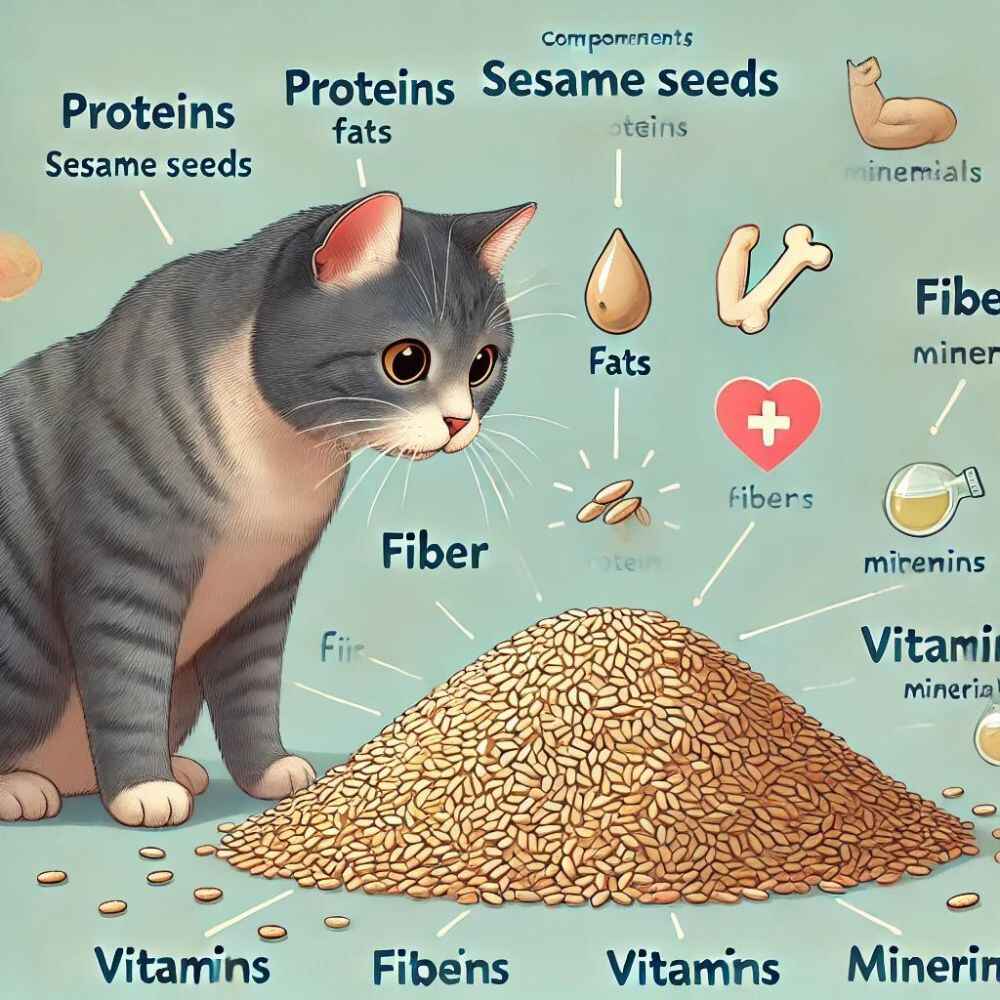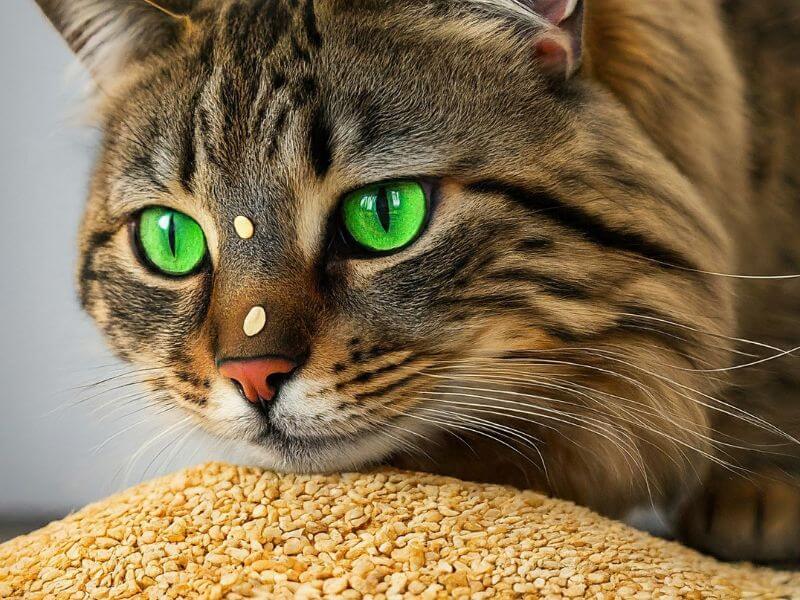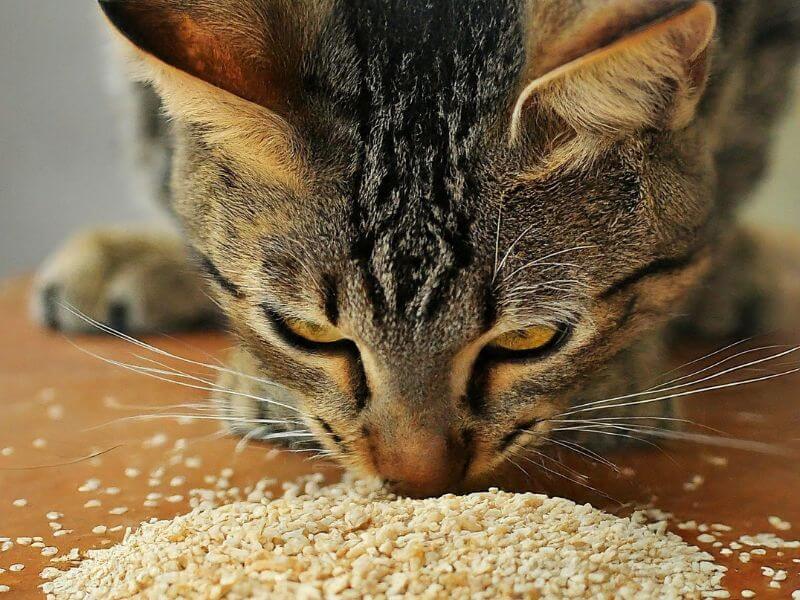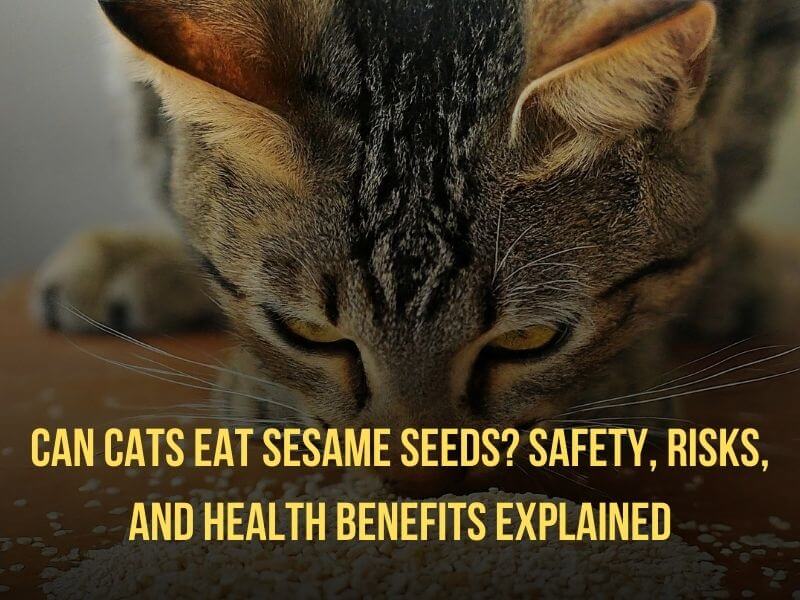As pet owners, we often want to share our favorite foods with our furry friends. But when it comes to cats, not everything good for us is good for them.
So, can cats eat sesame seeds? PetMD, a popular resource for pet health information, mentions that while sesame seeds are not on the list of toxic foods, they can pose minor risks like choking or allergic reactions.
They advise cat owners to focus on feeding their pets treats designed specifically for cats, which are formulated to meet their dietary needs.
Let’s explore this topic in detail.
- Why This Matters: Understanding Cat Nutrition
- Understanding Sesame Seeds
- Cats and Their Dietary Needs
- Can Cats Eat Sesame Seeds?
- Potential Risks of Feeding Cats Sesame Seeds
- How Many Sesame Seeds Are Too Many?
- Sesame Seed Products and Cats
- What to Do If Your Cat Eats Sesame Seeds
- Alternative Healthy Treats for Cats
- Homemade Cat Treat Recipes with Safe Ingredients
- Understanding Cat Behavior Around Food
- Veterinarian’s Advice on Feeding Human Foods to Cats
- Conclusion
- FAQs
Why This Matters: Understanding Cat Nutrition
Cats have unique dietary needs, and what they eat is crucial to their overall health. Understanding which foods are safe for your cat ensures they live a long, healthy, and happy life.
Understanding Sesame Seeds
What Are Sesame Seeds?
Sesame seeds are tiny, oil-rich seeds that come from the Sesamum indicum plant. These little seeds pack a punch with their rich, nutty flavor and are a common ingredient in many cuisines worldwide.
But just because they are healthy for us, does that mean they are okay for our pets?
Nutritional Profile of Sesame Seeds
Sesame seeds contain:
- Healthy fats
- Protein
- Fiber
- Essential minerals (like calcium, magnesium, and iron)
While these nutrients benefit humans, we need to think about whether they translate into benefits for cats.
Cats and Their Dietary Needs
What Do Cats Usually Eat?
Cats are obligate carnivores. This fancy term simply means they need a diet primarily composed of meat.
Their bodies are designed to get most of their nutrients from animal-based sources, unlike us humans who can thrive on a mix of plants and animals.
Are Cats Omnivores or Carnivores?
No doubt about it – cats are true carnivores. They require a diet rich in proteins and fats derived from animal tissues.
While they can nibble on certain plant-based foods, these should not form the core of their diet.

Can Cats Eat Sesame Seeds?
Is It Safe for Cats to Eat Sesame Seeds?
Yes, sesame seeds are technically safe for cats in small quantities.
They aren’t toxic or poisonous. However, just because they are not dangerous doesn’t mean they should become a regular part of your cat’s diet.
Possible Health Benefits of Sesame Seeds for Cats
- Minimal Benefits: Slight boost of fiber or a bit of protein.
- Not Significant: The benefits are minimal compared to what cats require.
Potential Risks of Feeding Cats Sesame Seeds
Choking Hazards: Are Sesame Seeds Too Small?
Believe it or not, sesame seeds might pose a choking hazard, especially for kittens or smaller cats. These seeds can get stuck in their throat or irritate if inhaled.
Allergic Reactions: Can Cats Be Allergic to Sesame Seeds?
Just like people, cats can have allergic reactions to almost anything, including sesame seeds.
Symptoms of an allergic reaction may include itching, swelling, or digestive issues like vomiting or diarrhea.
Digestive Issues: Are Sesame Seeds Hard to Digest for Cats?
Cats have a short digestive tract designed to process meat. Plant-based foods like sesame seeds may pass through undigested, potentially causing stomach upset or even constipation in some cases.
How Many Sesame Seeds Are Too Many?
Moderation is Key: How Much is Safe?
A few sesame seeds every now and then likely won’t harm your cat.
Dr. Sarah Wooten, DVM says, “If your cat gets into a few sesame seeds, don’t panic. Just watch for any signs of digestive upset, and remember that cats do best with a diet that is specifically tailored to their carnivorous needs.”
Think of it as a one-off treat, not a regular snack. If you’re ever in doubt, less is always more when feeding cats human food.

Sesame Seed Products and Cats
Sesame Oil: Can Cats Have It?
Sesame oil is not toxic to cats, but it is very high in fat. Feeding your cat oily foods can lead to gastrointestinal distress or contribute to obesity if given in large amounts.
Sesame Snacks: Are They Safe for Feline Friends?
Snacks like sesame seed crackers or sesame-coated breadsticks often contain other ingredients like salt, sugar, or spices that are harmful to cats. It’s best to avoid these altogether.
What to Do If Your Cat Eats Sesame Seeds
Signs of Trouble: What to Watch For
If your cat accidentally munches on a few sesame seeds, don’t panic. Watch out for any signs of discomfort such as vomiting, diarrhea, or coughing. Most cats will be just fine, but it’s always good to monitor them.
Immediate Steps to Take
If your cat seems unwell, contact your vet immediately. They may suggest bringing your pet in for an examination, especially if your cat shows signs of an allergic reaction or has trouble breathing.
Alternative Healthy Treats for Cats
What Other Seeds or Nuts Are Safe for Cats?
Generally, most seeds and nuts are not recommended for cats due to their high-fat content and potential choking hazards. However, small amounts of plain pumpkin seeds can be a good alternative, as they are often used as a natural dewormer.
Healthy Treats You Can Share with Your Cat
Lean meats like chicken, turkey, or even small amounts of cooked fish can make great treats. Always ensure they are free of seasoning and cooked thoroughly.
Homemade Cat Treat Recipes with Safe Ingredients
Easy Recipes to Try at Home
Consider baking cat treats using simple ingredients like canned tuna, oats, and eggs. Avoid adding any spices, salt, or sugar.
Tips for Making Cat-Safe Treats
Stick to ingredients you know are safe. Avoid dairy, excessive fats, and spices. Always introduce new treats slowly to ensure your cat doesn’t have an adverse reaction.

Understanding Cat Behavior Around Food
Why Do Cats Like to Eat Weird Things?
Cats are naturally curious creatures. They often investigate new things, including food, with their mouths.
This behavior might explain why your cat seems interested in your food, even if it’s not something they should eat.
How to Encourage Healthy Eating Habits
Keep your cat’s diet consistent and rich in high-quality cat food. Offer occasional treats in moderation and always supervise your cat when introducing any new foods.
Veterinarian’s Advice on Feeding Human Foods to Cats
What Experts Say About Cats Eating Human Foods
Veterinarians typically advise against feeding cats human foods regularly. Most human foods lack the specific nutrients cats need and can even be harmful.
Dr. Karen Becker, DVM, a holistic veterinarian, suggests, “While small amounts of sesame seeds are unlikely to harm your cat, they don’t add much value either. Focus on offering foods that cater to a cat’s specific nutritional needs.”
Importance of Consulting Your Vet
Before giving your cat any new food, it’s always a good idea to consult your vet. They can offer tailored advice based on your pet’s health, age, and dietary needs.
Conclusion
Final Thoughts on Cats and Sesame Seeds
While sesame seeds aren’t toxic to cats, they don’t offer significant benefits either.
If you want to treat your furry friend, opt for cat-friendly treats that align with their nutritional needs. Always remember: moderation is key!
A Call to Action: Always Prioritize Your Cat’s Health
When in doubt, consult your vet before introducing new foods. Your cat relies on you to make the best choices for their health and happiness!
FAQs
1. Can Kittens Eat Sesame Seeds?
No, it’s best to avoid feeding sesame seeds to kittens as their digestive systems are even more sensitive than adult cats.
2. Are Toasted Sesame Seeds Better or Worse?
Toasted sesame seeds are no better or worse for cats than raw ones, but they still aren’t recommended as a regular snack.
3. What About Black Sesame Seeds?
Black sesame seeds have a similar nutritional profile to white ones, so the same rules apply: minimal consumption and only as an occasional treat.
4. Are There Any Benefits of Sesame Seeds for Cats?
The health benefits of sesame seeds for cats are minimal. There are far better treats that can contribute positively to your cat’s diet.
5. How Often Can Cats Eat Sesame Seeds?
It’s best to avoid giving your cat sesame seeds regularly. If given at all, it should be in very small amounts and infrequently.

Pingback: Can Cats Eat Tortilla Chips? The Surprising Truth
Pingback: Can Cats Have Almonds? Risks and Safety Explained